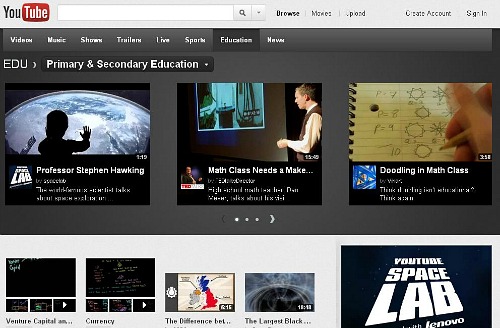YouTube has unveiled a new service to help teachers and students access the video-sharing giant’s vast treasures. YouTube for Schools presents network administrators with a “safe” option, allowing students to access only select educational content from YouTube EDU, a resource of video from partners including Khan Academy, PBS, TED, and universities such as MIT and Stanford. Teachers also have the option of creating their own playlists. No comments are allowed within YouTube for Schools. Gone, too, are the related videos that appear at the right on the main site.
But will this affect restricted access? Not according to the recent experience of Carolyn Foote. A librarian at Westlake High School, in Austin, TX, Foote approached the district IT department to open access to YouTube for Schools when the service was first announced two months ago. “But they said students can still access other YouTube content,” she reports via Twitter. “So they wouldn’t open it up. Our teachers do now have access to YouTube.” But for districts that block the site, it’s probably the same issue, she adds. “So as far as the filtering issues districts grapple with, [YouTube for Schools] isn’t helpful.”
 Foote, however, does think the organization of content and searchability on the new service would be helpful to educators.
Foote, however, does think the organization of content and searchability on the new service would be helpful to educators.
Melissa Techman says she doesn’t think she needs a new YouTube service. A teacher librarian at Broadus Wood Elementary School in Albemarle County, VA, Techman values the serendipity of searching the greater YouTube site, she says, “plus quietube.com,” a free site that enables viewing of YouTube content, without the ads, comments and images. Moreover, Techman’s school already subscribes to streaming content via Discovery Education. “One thing that would interest me,” she says, would be access to “fun, high-quality teacher and student-made videos.”
Still others are concerned about the potential effect of greater restrictions. “The danger of #YouTubeforSchools is pressure on open YouTube schools to limit access. It’s not all good,” tweeted Ira Socol, a special education technology scholar at Michigan State University’s College of Education. And with the precedent set by YouTube/Google, other sites might follow suit and promote tailored content for education, which raises questions about another form of gatekeeping and who determines what’s educational or appropriate.
‘Scares the pants off central administrators!’
Among sites that media specialists have attempted to unblock, YouTube was tops by far, according to SLJ‘s spring 2011 technology survey. Forty-nine percent of respondents asked to lift a restriction in their school against the world’s largest video-sharing site, compared to 15 percent for the second site in the category, Facebook. Sixty-four percent succeeded in gaining YouTube access.
Respondents had additional comments on efforts to unblock YouTube. Here’s a sample:
We requested it to be unblocked for staff only. It is still blocked for students.
Found ways to download and convert YouTube to usable format.
We can have specific videos unblocked by request.
No go… told network cannot handle streaming video.
The Tech Director will unblock it for specific classroom use, then it’s blocked again.
Scares the pants off central administrators!
Sent in a request to our state office.
It was open for one day.
To access publisher book trailers usually.
Tech said there was no way to open it for teachers and block it for students.
The district has a committee that is looking into the idea of giving teachers control of what is blocked and not.
School will not budge on blocked sites.
Bandwidth issue more than censorship.
City-wide bans cemented in place.
Use Edutube and teachertube.
Have to save at home and bring on flash drive.
District refused, unblocked TeacherTube.
Superintendent unblocked.
This was a huge breakthrough this year – our district opened this up and the response has been overwhelmingly positive.
Among our most popular articles on SLJ.com: When YouTube is blocked (way more than eight ways around).


